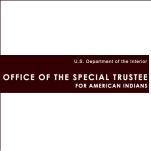OST was established by the American Indian Trust Fund Management Reform Act of 1994 (Public Law 103-412), which addressed the fiduciary responsibilities of the United States toward Native Americans. It decreed the need for more effective management of their funds held in trust by the government, and that the OST should remain in existence until the Special Trustee who heads it is satisfied that all trust reforms have been accomplished. In 1996 the Secretary of the Interior ordered that the responsibility for trust fund management and preparation of financial statements for tribal and Indian Money Account funds (IIM) still being shepherded by the BIA be transferred to OST. Since then, OST has prepared, and independent public accountants have audited, yearly financial statements of the Indian Trust funds. Also in 1996, Elouise Cobell, a banker from the Blackfoot Nation, filed a class-action lawsuit now called Cobell vs. Kempthorne (previously Cobell vs. Norton and Covell vs. Babbit), claiming that the government had, since late in the 19th century, incorrectly accounted trusts it had held for hundreds of thousands of Indians, and that proper accounting would show that the government owed them billions of dollars. This led to a massive investigation, at a projected cost of more than $250 million, to aim by 2011 to have reconciled the figures and reformed the entire accounting process. In March 2007, the White House offered a total of $7 billion over 10 years to settle individual and tribal claims, pay for a computer security upgrade, and extinguish the suit, as well as prohibit any future litigation on the subject. The plaintiffs did not agree to the settlement, and on January 30, 2008, a federal judge ruled it would be “impossible” to ever produce reliable information from all those years back.
Federal judge grants appeal of Cobell judgment
(by Jodi Rave, Missoulian)
- Table of Contents
- Overview
- History
- What it Does
- Where Does the Money Go
- Controversies
- Suggested Reforms
- Comments
- Leave a comment


On September 21, President Barack Obama announced Vincent Logan, a member of the Osage Nation of Oklahoma, as his nominee for Special Trustee for American Indians. The Office of Special Trustee (OST) is an agency within the Department of the Interior established in 1994 to oversee and reform management and accountability of policies and practices regarding about $3.7 billion of Indian funds held in trust by the Federal Government. The position has been vacant since Ross Swimmer, a member of the Cherokee Nation who held the post for nearly six years, resigned in January 2009. If confirmed by the Senate, Logan would be just the fourth person to lead OST and only the second tribal member.
Born circa 1957 and raised in Norman, Oklahoma, Vincent Garfield Logan earned a B.S. in Political Science at Oklahoma State University in 1979, and a J.D. at the University of Oklahoma College of Law in 1983. Relocating to New York in 1986, Logan attended Columbia University’s School of International and Public Affairs.
Logan practiced law in the Antitrust Division at the United States Department of Justice from 1996 to 1998, and as a corporate finance attorney for Schulte, Roth, & Zabel from June 2001 to February 2006. Shifting gears, Logan worked as a “Private Wealth Associate” in the Private Banking and Investment Group at Merrill Lynch from March 2006 to March 2009, when Merrill Lynch, a casualty of the 2008 financial crisis, was taken over by Bank of America. Undaunted, Logan founded his own firm, The Nations Group, LLC, which works with Native American tribes on asset management, investment strategies, and financial education.
Logan was appointed to the Oklahoma State University Foundation Board of Governors in September 2010.
-Matt Bewig
What Should Tribal Nations Expect From Wall Street? (by Diane J. Schmidt, Indian Country Today Media Network)

Ross Swimmer Cartoon (by Marty Two Bulls, Indian Country Today)
- Latest News
- D.C. Public Schools will Teach all Second-Graders to Ride a Bike
- New Rule in Germany Limits Sales of Sex-Themed E-Books to 10pm to 6am
- What Happened to the 6-Year-Old Tibetan Boy the Chinese Government Kidnapped 20 Years Ago?
- U.S. Ambassador to Turkey Photoshops his Hair Color to Mock Turkish Mayor
- Mystery Artist Calls Attention to Unfixed Potholes by Drawing Penises around Them
OST was established by the American Indian Trust Fund Management Reform Act of 1994 (Public Law 103-412), which addressed the fiduciary responsibilities of the United States toward Native Americans. It decreed the need for more effective management of their funds held in trust by the government, and that the OST should remain in existence until the Special Trustee who heads it is satisfied that all trust reforms have been accomplished. In 1996 the Secretary of the Interior ordered that the responsibility for trust fund management and preparation of financial statements for tribal and Indian Money Account funds (IIM) still being shepherded by the BIA be transferred to OST. Since then, OST has prepared, and independent public accountants have audited, yearly financial statements of the Indian Trust funds. Also in 1996, Elouise Cobell, a banker from the Blackfoot Nation, filed a class-action lawsuit now called Cobell vs. Kempthorne (previously Cobell vs. Norton and Covell vs. Babbit), claiming that the government had, since late in the 19th century, incorrectly accounted trusts it had held for hundreds of thousands of Indians, and that proper accounting would show that the government owed them billions of dollars. This led to a massive investigation, at a projected cost of more than $250 million, to aim by 2011 to have reconciled the figures and reformed the entire accounting process. In March 2007, the White House offered a total of $7 billion over 10 years to settle individual and tribal claims, pay for a computer security upgrade, and extinguish the suit, as well as prohibit any future litigation on the subject. The plaintiffs did not agree to the settlement, and on January 30, 2008, a federal judge ruled it would be “impossible” to ever produce reliable information from all those years back.
Federal judge grants appeal of Cobell judgment
(by Jodi Rave, Missoulian)
Comments


On September 21, President Barack Obama announced Vincent Logan, a member of the Osage Nation of Oklahoma, as his nominee for Special Trustee for American Indians. The Office of Special Trustee (OST) is an agency within the Department of the Interior established in 1994 to oversee and reform management and accountability of policies and practices regarding about $3.7 billion of Indian funds held in trust by the Federal Government. The position has been vacant since Ross Swimmer, a member of the Cherokee Nation who held the post for nearly six years, resigned in January 2009. If confirmed by the Senate, Logan would be just the fourth person to lead OST and only the second tribal member.
Born circa 1957 and raised in Norman, Oklahoma, Vincent Garfield Logan earned a B.S. in Political Science at Oklahoma State University in 1979, and a J.D. at the University of Oklahoma College of Law in 1983. Relocating to New York in 1986, Logan attended Columbia University’s School of International and Public Affairs.
Logan practiced law in the Antitrust Division at the United States Department of Justice from 1996 to 1998, and as a corporate finance attorney for Schulte, Roth, & Zabel from June 2001 to February 2006. Shifting gears, Logan worked as a “Private Wealth Associate” in the Private Banking and Investment Group at Merrill Lynch from March 2006 to March 2009, when Merrill Lynch, a casualty of the 2008 financial crisis, was taken over by Bank of America. Undaunted, Logan founded his own firm, The Nations Group, LLC, which works with Native American tribes on asset management, investment strategies, and financial education.
Logan was appointed to the Oklahoma State University Foundation Board of Governors in September 2010.
-Matt Bewig
What Should Tribal Nations Expect From Wall Street? (by Diane J. Schmidt, Indian Country Today Media Network)

Ross Swimmer Cartoon (by Marty Two Bulls, Indian Country Today)
- Latest News
- D.C. Public Schools will Teach all Second-Graders to Ride a Bike
- New Rule in Germany Limits Sales of Sex-Themed E-Books to 10pm to 6am
- What Happened to the 6-Year-Old Tibetan Boy the Chinese Government Kidnapped 20 Years Ago?
- U.S. Ambassador to Turkey Photoshops his Hair Color to Mock Turkish Mayor
- Mystery Artist Calls Attention to Unfixed Potholes by Drawing Penises around Them





Comments